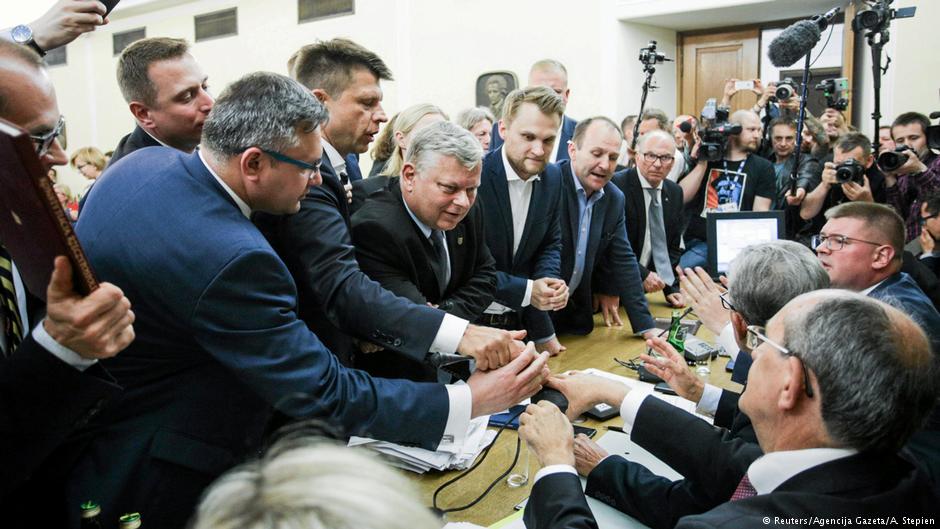Polish lawmakers in the lower house have passed a law that hands control of the country's Supreme Court to politicians. Critics have said the bill will kill judicial independence. It still has to pass the upper house.
Polish lawmakers in the lower house of parliament on Thursday voted through a controversial reform of the Supreme Court proposed by the ruling Law and Justice Party (PiS).
The PiS-controlled lower house of parliament voted in favor 235 to 192 -- with 23 abstentions. It still needs to pass the upper house, which is also controlled by the PiS, and be signed by President Andrzej Duda. A Senate commission was due to open debate on the bill later Thursday, and was expected to approve it on Friday.
Duda, who is closely allied with the PiS, refused a meeting with European Council president Donald Tusk, who had expressed concern over the situation, he announced on Thursday.
Tusk released a statement after the vote again requesting a meeting with Duda. He said Poland risked being marginalized by the EU because its moves went against European values.
The bill has drawn condemnation from the European Union and led to street protests.
Protesters started kicking and hitting the metal barriers that separate them from the parliament grounds after the bill passed. Some carried banners urging Duda to veto the bill. Further demonstrations are expected on Thursday evening.
The new law grants the nation's president the power to influence the court's work and to appoint its judges. It also calls for the immediate dismissal of the court's current judges, except those chosen by the president.
EU may trigger Article 7
The EU had warned Poland that if it passed the laws, it could be sanctioned and have its voting rights suspended in the Council of Ministers, a top EU decision making body.
"Recent measures taken by the Polish authorities on the judicial system greatly amplify the threat to the rule of law in Poland," European Commission Vice President Frans Timmermans said on Wednesday.
He said he could be close to triggering Article 7, a never-before-used sanction against EU members who violate fundamental rights.
Since being elected to power in 2015, the PiS has sought to expand its influence over the courts and media, prompting the EU to launch a review of the rule of law in Poland last year.
Malgorzata Kidawa-Blonska, the former Chairman of the Sejm (lower house), condemned the vote on Twitter on Thursday. "Members of the PiS raised their hands to deprive citizens of the right to free courts," she wrote.
Wenzel Michalski, the German Director of Human Rights Watch, said the bill would kill judicial independence in Poland.
Despite international criticism Poland's lawmakers passed controversial bill
— Wenzel Michalski (@WenzelMichalski) 20 lipca 2017
that will kill judicial independence. https://t.co/N4vK6Z3Ok4 pic.twitter.com/jkgE9yPXTO



